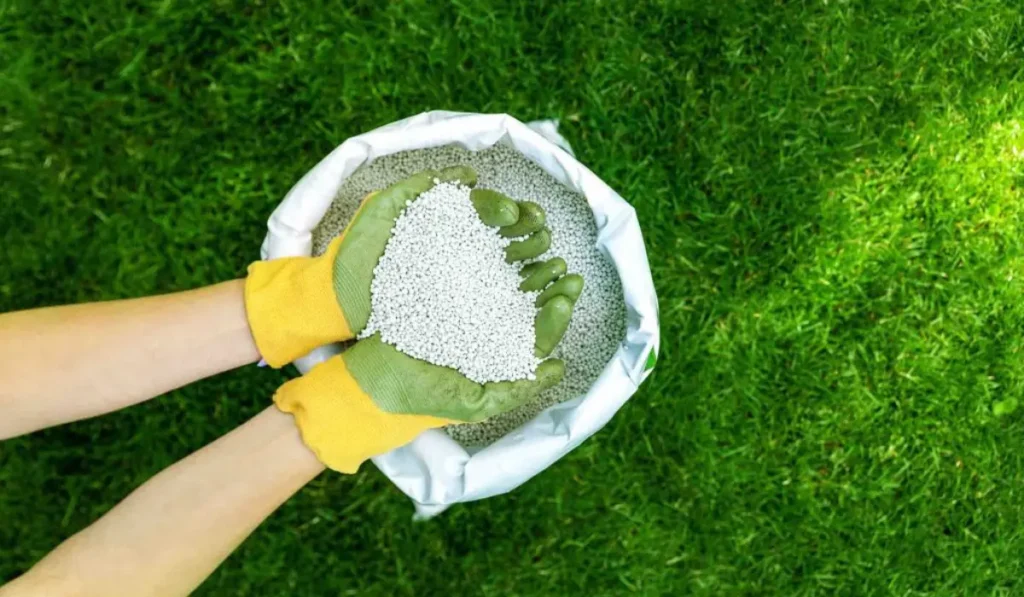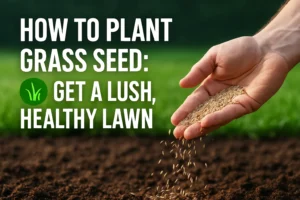Every homeowner wants a lush, green lawn, but it’s hard to maintain that without the right fertilizer. Many people look for commercial fertilizers, but what if you could use homemade, organic alternatives? In this article, we will look at the best homemade lawn fertilizers, how to make them, and how they keep the lawn and environment fresh.
Why Choose Homemade Lawn Fertilizers?

Homemade lawn fertilizers are a chemical-free and green way to feed your lawn. Here are a few reasons you might like to make your own:
- Affordable: Fertilizers available in stores are typically costly, and using natural/organic types is more affordable.
- Eco-friendly: Some commercial fertilizers have chemicals that are harmful to the environment. Natural homemade fertilizers for the environment and the pocket!
- Customizable: You can customize homemade fertilizers to fit the specific needs of your lawn.
Organic lawn fertilizers are better for lawns, families, and the environment. They’re even safe for your pets!
The Essentials of Homemade Lawn Fertilizer
Before we get into the various homemade fertilizers for your lawn, we first should understand the main nutrients grass requires. What are we looking for in a good lawn fertilizer?
- Nitrogen (N) = Add to encourage lush green grass growth.
- Phosphorus (P): Needed for root health.
- Potassium (K): This nutrient strengthens the grass, keeping it greener later in the season; moreover, it is more resistant to diseases and drought.
These components are generally reflected in the fertilizer’s N-P-K ratio, such as 16-4-8, which indicates the percentages of nitrogen, phosphorus, and potassium in the mixture.
Best Homemade Garden Fertilizer Recipe
Many fertilizer products are available for purchase, but these are usually laden with potentially harmful chemicals and compounds that can destroy the soil and can even ruin your plants. It’s time to look at some of the top homemade lawn fertilizers made with natural ingredients.
Compost Tea Fertilizer
Compost tea is a great way to enrich your lawn. It has beneficial microbes like those that can break down organic matter in the soil.
Ingredients:
- 1 part compost
- 5 parts water
Instructions:
- Stuff compost into a mesh bag or old pillowcase.
- Immerse it in a container of water.
- Let it steep for 24-48 hours.
- Pour the tea onto your lawn.
Advantages: Compost tea increases soil health, is a source of vital nutrients, and acts as a disease preventative.
Epsom Salt and Ammonia
Epsom salt contributes magnesium to the soil, while ammonia supplies nitrogen. They all work together to help your lawn grow thick and green.
Ingredients:
- 1 cup of Epsom salt
- 1 cup of ammonia
- 1 gallon of water
Instructions:
- Combine the ingredients in a watering can or spray bottle.
- Evenly spread over your lawn, targeting any patchy areas.
Benefits: This product improves the lawn leaf growth, grass color, and root development.
Fish Emulsion Fertilizer
Fish emulsion is an excellent organic fertilizer that supplies plants with nitrogen, phosphorus, and potassium. Moreover, it can be useful for grass that’s a little tired or stressed.
Ingredients:
- 1 tablespoon of fish emulsion
- 1 gallon of water
Instructions:
- Mix the fish emulsion with water.
- Use a spray bottle or watering can on the lawn.
Pros: Fish emulsion promotes hardy growth and increases the overall health of your lawn.
Coffee Grounds and Banana Peels
Coffee grounds contain nitrogen, and banana peels are a great source of potassium. The mix is ideal for a well-titrated lawn.
Ingredients:
- Used coffee grounds
- Banana peels
Instructions:
- Scatter coffee grounds and chopped banana peels on your lawn.
- Thoroughly water to help the nutrients seep into the soil.
Advantages: This organic fertilizer helps to provide strong grass growth and a beautiful green lawn.
Molasses and Water Fertilizer
Molasses will help stimulate the beneficial microbial activity in your soil, allowing for a healthier and more nutrient-rich lawn.
Ingredients:
- 1/2 cup of molasses
- 1 gallon of water
Instructions:
- Combine molasses and water in a gallon jug.
- Spray the solution on the lawn.
Pros: Molasses increases soil microbial activity, nutrient absorption, and improves the structure of the soil.
Organic vs. Synthetic Fertilizer
| Category | Organic | Synthetic |
| Ingredients | Organic | Manufactured, may be organic or synthetic |
| Costs | Usually inexpensive if ingredients are already available | Generally more expensive |
| Convenience | Can save a trip to the store | Ready-to-use |
| Nutrient Content | Nutrient levels are often unknown or unbalanced | Clearly labeled with (N), (P), and (K) content |
| Labeling & Safety | Usually lacks | Includes detailed product labels |
| Environmental Factor | Can be eco-friendly, but some may contain harmful synthetic chemicals | Can cause water pollution, but it is safe when applied correctly |
| Effectiveness | Less effective or inconsistent | More effective and reliable |
| Sustainability | Potentially sustainable | Some organic products are eco-friendly, others may not be |
| Time & Effort | It may take longer to prepare | Requires minimal preparation |
| Risk of Over-application | High | Lower if used as directed |
Conclusion
Are you ready to keep your lawn healthy while preserving the environment? Usage of homemade fertilizers is an inexpensive and eco-friendly way to ensure that the grass receives the best ingredients for further growth. If you identify that the above homemade fertilizer will make your lawn better, then start testing until you find the best one.
FAQs
Yes, it is safe for all types of grass. However, make sure to test the fertilizer on a small area to see how your lawn reacts.
It depends on the type of fertilizer you’re using. Generally, apply the homemade fertilizers once every 4-6 weeks during the growing season.
Homemade fertilizers can be as effective (or more) than the store-bought variety. They can be more nutrient-dense as well as free of chemicals that might harm the environment.
Commonly, homemade fertilizers are okay to use, but they don’t give you the fast returns that synthetic fertilizers do. However, consistency is also important when you’re using natural fertilizers.





